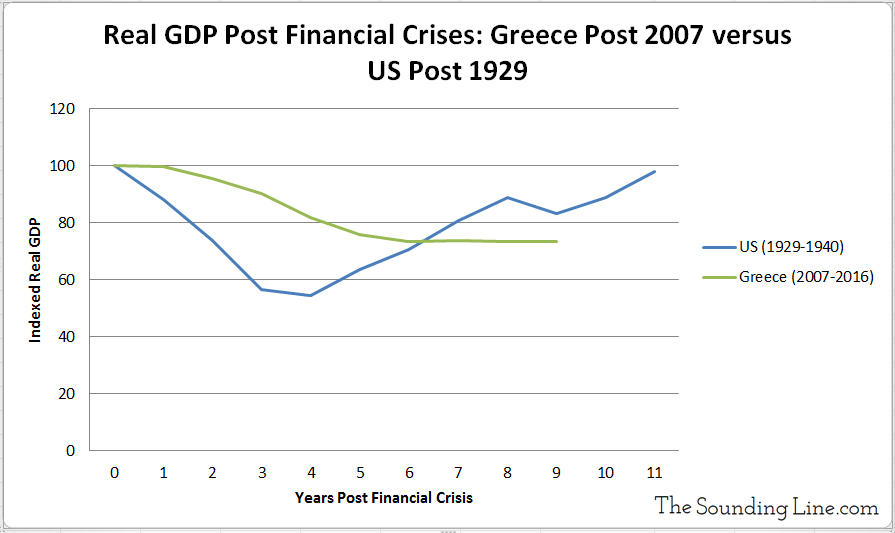Submitted by Taps Coogan on the 14th of September 2017 to The Sounding Line.
Enjoy The Sounding Line? Click here to subscribe for free.
The Greek economy is experiencing a slower recovery from the 2008 Financial Crisis than the United States experienced during the Great Depression.
Following the ‘Back Tuesday’ Wall Street crash of October 1929, the US entered into the Great Depression, the worst depression in US history. The depression took hold quickly and by the end of 1933, the US economy had shrunk an astounding 45% compared to its peak in 1929 when adjusted for inflation. After 1933, the US economy began a slow recovery, only surpassing 1929’s real GDP in 1941 when spending for World War II jolted the US economy out of depression.
Illustrating the severity of the current economic crisis in Greece, the following chart shows the inflation adjusted GDP of the US indexed from 1929 through 1940 and of Greece indexed from 2007 through 2016. While the US economy declined proportionally more than Greece during the first years of its respective financial crisis, it recovered much faster. Ten years after the 2007 financial crisis the Greek economy is still approximately 26% smaller than before the crisis with no recovery in real GDP as of the end of 2016. By comparison, after ten years of the worst depression in American history, the US economy was just 16% smaller despite having fallen a full 45% in the first four years of the depression.

All of this goes to illustrate the magnitude of the economic crisis that is still unfolding in Greece and southern Europe. As we discussed here, out of 181 countries analyzed, Greece has seen the largest absolute decline in GDP of any country since 2000 with Italy and Portugal close behind. Furthermore, the number of people employed in the Eurozone is still smaller than in 2008 despite its population having grown by over six million people.
If the EU and Eurozone leaders are to have any hope of holding the European Union together, they desperately need to address the economic depression in southern Europe, a depression that is now proving more enduring than the Great Depression. Judging by the fact that two thirds of Italians are supporting Euro-skeptic parties in the upcoming general election, it may be too late.
Would you like to be notified when we publish a new article on The Sounding Line? Click here to subscribe for free.

